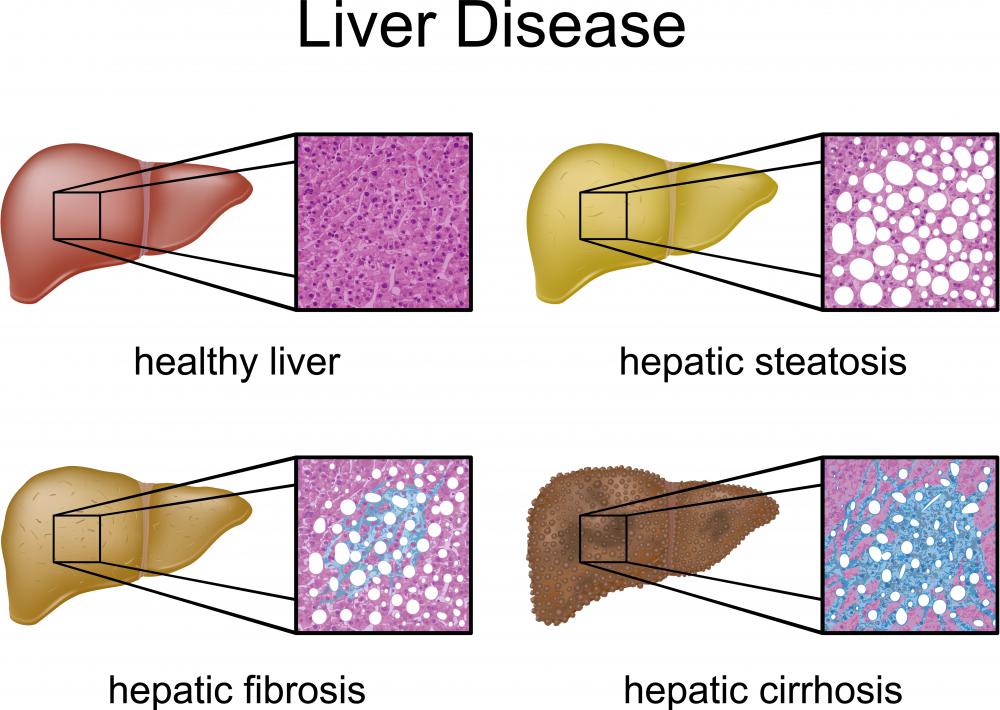At WiseGEEK, we're committed to delivering accurate, trustworthy information. Our expert-authored content is rigorously fact-checked and sourced from credible authorities. Discover how we uphold the highest standards in providing you with reliable knowledge.
What Are the Common Causes of Stomach Swelling?
Some of the common causes of stomach swelling include a blockage within the intestinal tract, hormonal changes, and certain health conditions such as ascites, liver diseases, cancer, and heart problems. Eating the wrong types of foods, overeating, and poor digestion can also contribute to a swollen stomach. The symptoms of stomach swelling include stomachache, fullness, and shortness of breath.
Overeating any type of food can cause a swollen stomach immediately after a meal. The swelling usually occurs when the gases or fluids build up within the stomach or digestive tract due to slow or poor digestion. Greasy foods, sodas, and dairy products are some of the worst offenders that can cause the symptoms to flare up. Excess amounts of salt can also contribute to abdominal swelling as the body has to hold onto excess fluids in order to dilute the extra salt. Even fresh fruits and vegetables need to be consumed in moderation as they too can cause gas to build up within the abdomen.

Stomach swelling often occurs when there is an obstruction within the digestive tract. The obstruction could be due to slow bowel movements, trapped feces, a cancerous tumor, or parasites. Inflammatory diseases such as Crohn's disease, and other diseases within the digestive system are also common contributors to a swollen stomach. Women who experience severe hormone fluctuations during their menstrual cycles might see temporary increases in their abdomens as well.

Ascites is a condition wherein excess fluids accumulate within the peritoneal cavity, and it can cause the stomach and abdomen area to swell. This condition is often caused by liver diseases, such as cirrhosis and hepatic veno-occlusive disease. Other health conditions, such as heart problems, cancer, hypothyroidism, and infections, can also play a role in stomach swelling.

Diagnosing the cause of abdominal swelling is very important as it could be the result of a number of serious health conditions. Therefore, any kind of abdominal pain or discomfort should be discussed with a health care provider as soon as possible in order to avoid severe problems. The sooner the problem is found, the sooner one can begin treatment.

Making certain dietary changes can help in treating stomach swelling naturally. Eating smaller meals and avoiding foods that aggravate the digestive system can provide almost immediate relief. Fruits and vegetables are excellent foods to consume; however, they should be introduced to the body gradually in order to avoid excess gas and other symptoms. In cases when the condition occurs as a result of an underlying health condition, it is best to treat it in order to reduce the stomach swelling.
AS FEATURED ON:
AS FEATURED ON:














Discussion Comments
I had a tummy tuck four and a half months ago. I have more swelling now than I did at two months and it's painful at the end of the day. I'm going to start wearing my compression garment again. This stinks!
@ysmina-- That's normal! Or at least that's what the doctors always say. I had swelling for five months after my tummy tuck and then it slowly went down. But I have heard that for some, it can take up to seven months or even longer!
Where is the swelling exactly? Is it on the upper abdomen or the lower? You should definitely specify where the swelling is, what it feels like and the pain when you see or speak to your doctor.
Sometimes, post-operation, there can be fat accumulation on the upper abdomen that looks like swelling. They may have to go back in to remove that. So just be conscious about it and pay attention to when the swelling gets worse. You may be engaging in physical activity that is making it swell more too.
@ysmina-- Oh my, sorry to hear about that! Unfortunately, I can't give you any advice as I didn't go through a tummy tuck operation myself. But my sister in law had a tummy tuck after her third child. I believe she was swollen around the stomach area for a long time. You should call your doctor to put your mind at ease, I don't think you have to wait until your check-up.
I experience bloating in my stomach too. I guess that's something different though. I'm not swollen per se , I just have a lot of flatulence.
The reason for my bloating is Crohn's disease and the digestive issues it causes. The disease itself causes inflammation, so I usually look bloated even if I'm not. But I'm also very sensitive to many foods and experience constipation from time to time, which makes it worse.
I had a tummy tuck operation four months ago and have been experiencing stomach swelling and pain since.
My doctor told me that some swelling is inevitable and that I shouldn't worry. But I think four months is a long time and the swelling related to surgery should have disappeared by now. It's still very much there.
Has anyone else had a tummy tuck operation? Did you experience a lot of swelling afterward and if so, for how long?
I have another check-up with my doctor next month. But I'm not sure if there is something else going on and if I need to be seen earlier than that.
Post your comments